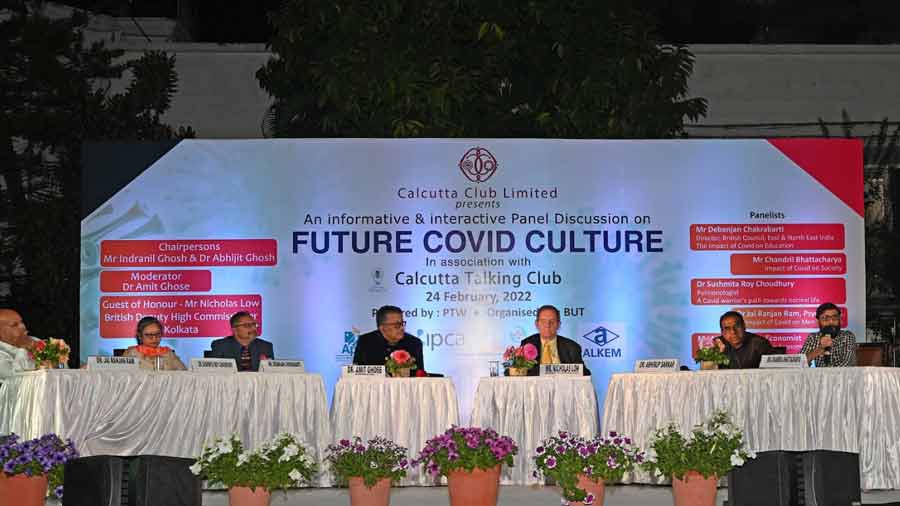With the third wave of the Covid-19 pandemic on its way out and life returning to normal, albeit a masked normal, the panel discussion held at the Calcutta Club lawns, on February 24, was particularly pertinent.
Presented by Calcutta Club, in association with the Calcutta Talking Club, the panel discussion titled “Future Covid Culture” tackled the impact of the pandemic on various aspects of our lives and what the future looks like.
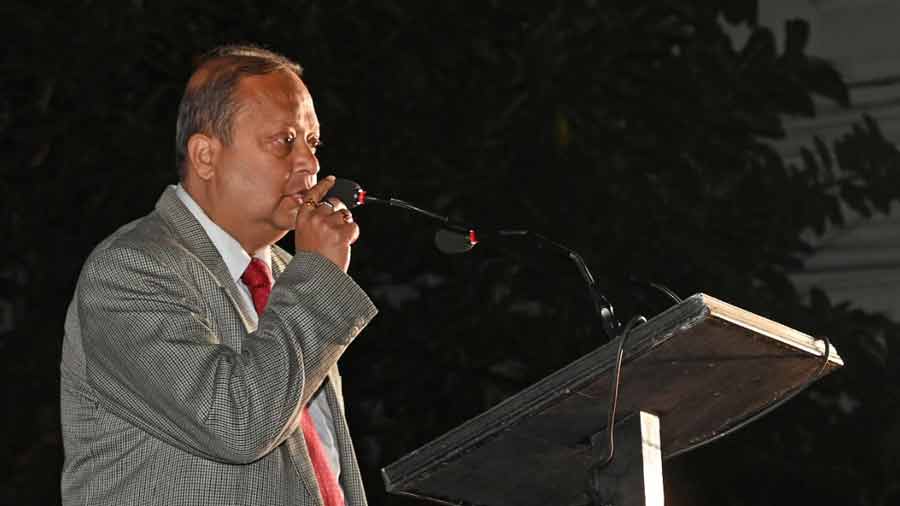
Calcutta Club president Indranil Ghosh delivers the welcome address
Moderated by urologist and member of the health sub-committee of the club, Dr Amit Ghose, the panel comprised economist Abhirup Sarkar, writer and lyricist Chandril Bhattacharya, British Council director, East and Northeast India Debanjan Chakrabarti, psychiatrist Dr Jai Ranjan Ram and pulmonologist Dr Sushmita Roy Chowdhury. British Deputy High Commissioner Nick Low was the guest of honour.
“I believe this panel discussion will be a unique one and would guide us to take future course of action in the field of education, economics, healthcare and so on,” said Calcutta Club president Indranil Ghosh.
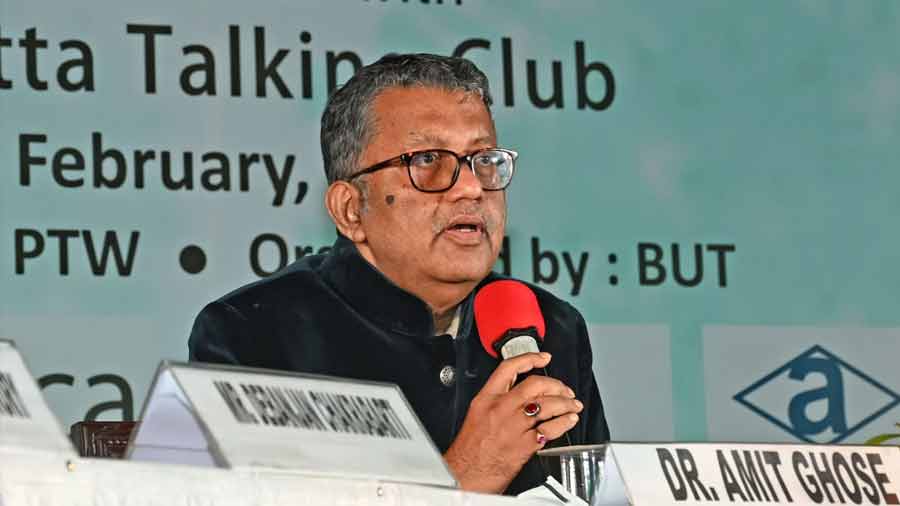
Dr Amit Ghose was the moderator of the panel discussion titled ‘Future Covid Culture’
"The last few years, this new C disease — so long humanity was terrified of the capital C that was cancer — arrives, the devastating C called Covid. Everyone described it as destructive and devastating. Not a bullet was fired, not a cannonball was discharged. It was just a microbe we had to fight,” said Ghose before handing over the mic to Low for the keynote address.
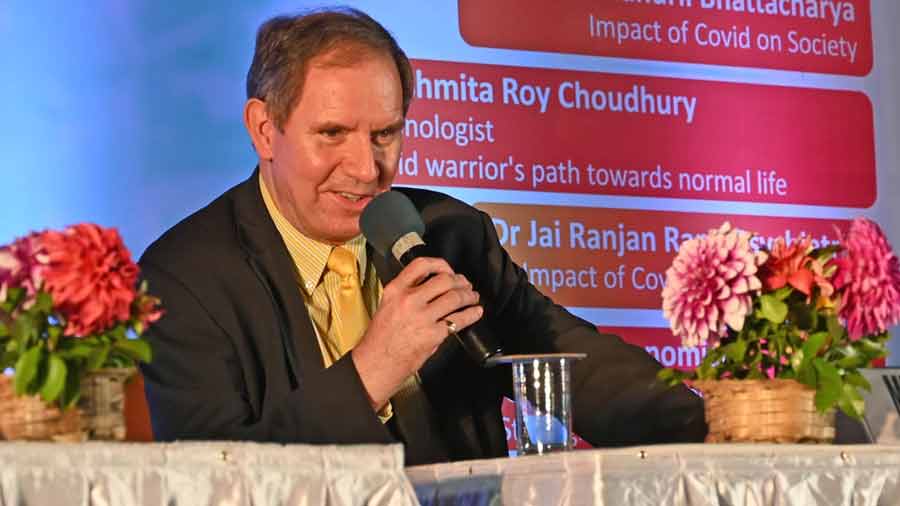
Nick Low, the British Deputy High Commissioner in Kolkata, delivered the keynote address
Low set the tone for the evening, reiterating that Covid-19 was here to stay, and that it will probably become endemic and something we have to live with. “My government’s policy, and it is possibly going to be followed around the world, is protection against hospitalisation and death. We don’t shut down our country because there is flu in winter,” said Low, before going on to enumerate various scenarios that might play out in the future and how vaccinating the planet was the number one action that needed to be taken.
The British Deputy High Commissioner also touched upon how Covid-19 was going to play into a lot of other long-term trends in geopolitics, including climate change, systemic competition with China, securitisation of the Indo-Pacific region and rapid technological advances.
‘The way forward is to talk about investing in health’
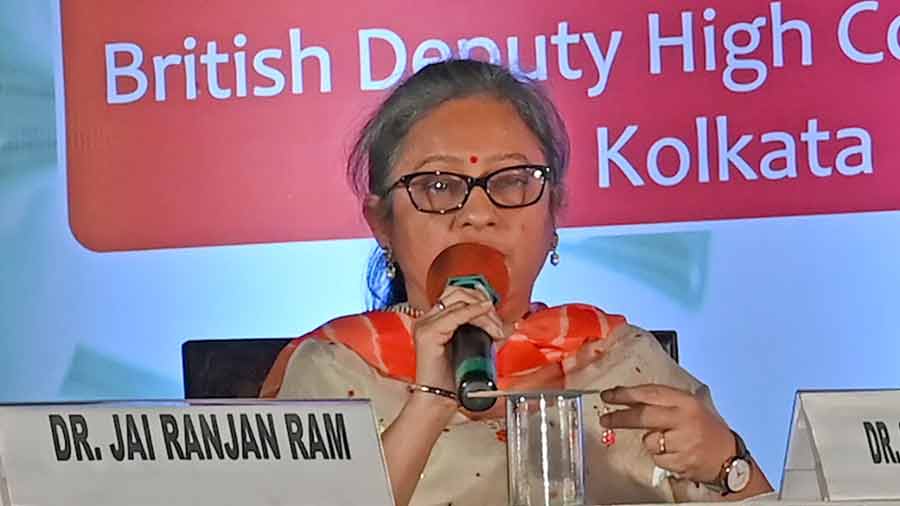
Dr Sushmita Roy Chowdhury stressed the importance of investing in health
Pulmonologist Sushmita Roy Chowdhury shone a light on something that has become of crucial importance in living with Covid-19, that of fitness and being healthy, which was all that one talked about when they spoke of Covid. “All this while we have been talking about treating and investing in the disease; I think the way forward is to talk about investing in health. We talk about having a good meal or having a good time but we rarely talk about, whether it is in schools or workplaces, how fit we are,” said Roy Chowdhury, adding two other things that need to be continued in terms of good practice going forward — vaccinations, which includes making vaccines universal and free, the use of masks and developing “sneeze and cough hygiene”.
‘Covid pushed the grand dream of digital education over the precipice’
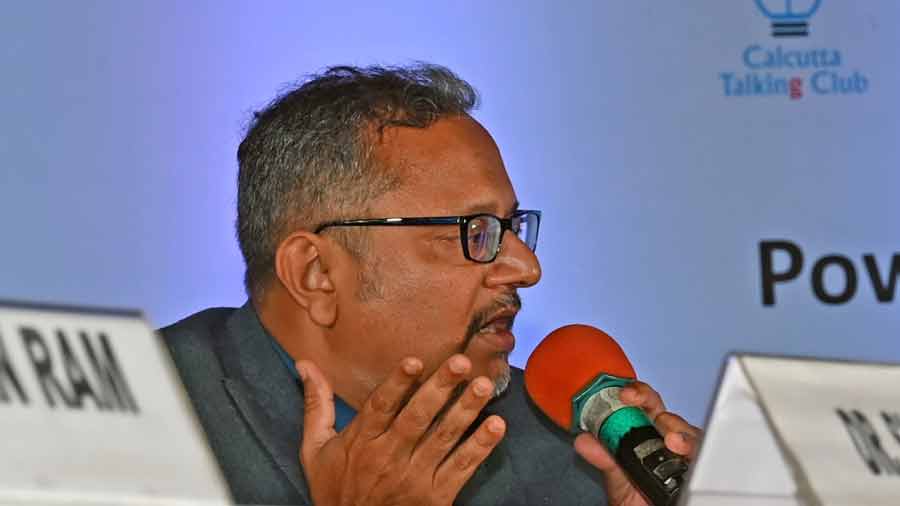
Debanjan Chakrabarti talked about the positive and negative aspects of digital education
Debanjan Chakrabarti spoke of the pandemic and education as a professional who was in charge of UK’s cultural and educational activities in East and Northeast India, as well as the husband of a professor of English and the father of a 14-year-old daughter and how each of them had to adapt to the changed circumstances. “For those of us involved in education and the domain of policy making, we have been talking about a great new revolution of digital technology for the last decade and that time never arrived till Covid pushed the grand dream of digital education or ed-tech over the precipice,” said Chakrabarti. While acknowledging the expanding reach ed-tech has made possible and how it will shape the future, Chakrabarti also pointed out the downside of it including the widening of the digital divide and the loss of the social aspect of education that one gets from being physically present in an educational institution.
The way businesses are organised will change
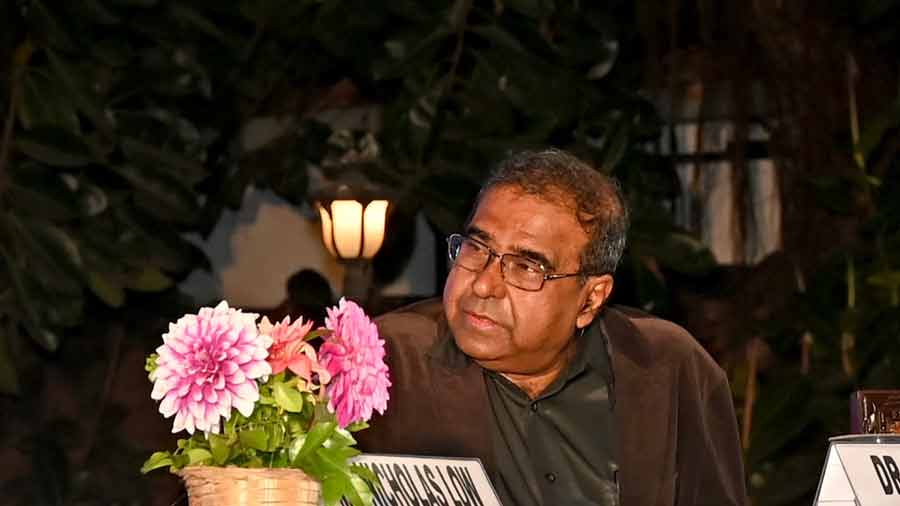
Abhirup Sarkar explained the economic impact of Covid-19
Economist Abhirup Sarkar tried to make sense of the dichotomy of the rising Sensex and the crashing economy. “You see, all sectors were not doing badly. Medical goods, online supplies, etc were doing well. When you calculate the Sensex, you take the best 30 companies over a period of six months, and these companies change. Which explains why we see this dichotomy,” explained Sarkar. He believes that going forward, the supply chain disorder that the pandemic has caused will disappear, but the way businesses are organised will change. He also talked about the past where pandemics were followed by deep depressions. “There have been researches into the long-term economic effects of the pandemic in the past. One thing was clear, after the pandemics there was a distinct rise in saving propensities, as a result rates of interest were low but at the same time the demand for goods was also low,” said Sarkar.
‘No family has remained untouched… the impact of it will be lifelong’
The conversation then moved to the pandemic and its effects on mental health with Ghose mentioning reports showing a 25 percent increase, worldwide, of anxiety and depression. “No family has remained untouched,” said Jai Ranjan Ram, requesting everyone to be mindful about it, especially with regard to children. “We know that the first thousand days are crucial for how they behave, how they grow up, how they become adults and their entire brain functioning. Imagine a three or four-year-old child who has been completely home-bound and has not been able to go out and mingle. Their neuronal network, which is the basis of future behaviour, future learning, future social skills, is like a plant which grows in a desert and the impact of it will be lifelong,” said Ram, observing how there has been a spike in developmental disorders, learning disorders and other such issue among children below 5 years of age.
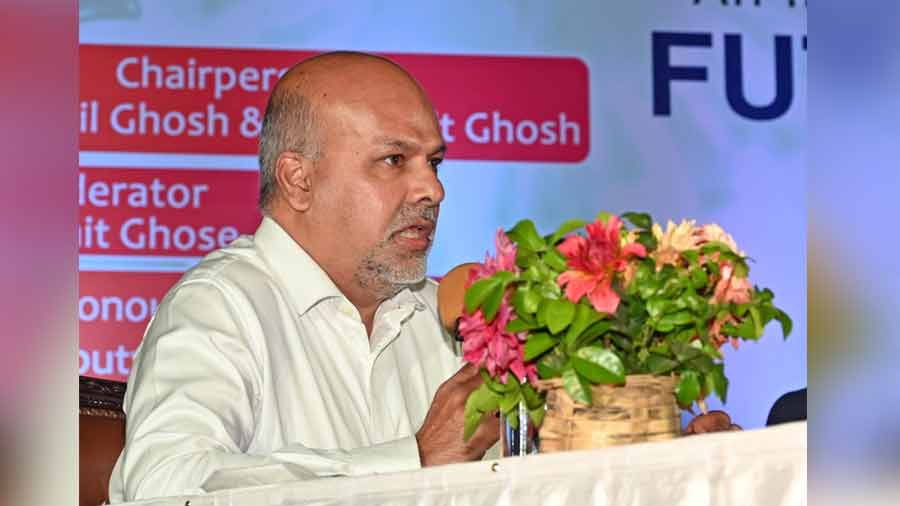
Dr Jai Ranjan Ram drew attention to the impact of the pandemic on children and the elderly
Ram gave a shout out to the teachers, who he called the “unsung heroes” of the pandemic, along with the frontline workers, drawing a round of rousing applause from the audience. “Online education was thrown at them and many of them rose to the challenge for which they were never trained,” reminded Ram. He also spoke about how we should be mindful of the elderly and how taking two or three years of their lives, like the pandemic has done, was such a disappointment leading to grief and sadness, let alone having to depend on technology that they are not comfortable with.
‘We as a society have learned a great skill, that of blaming others’
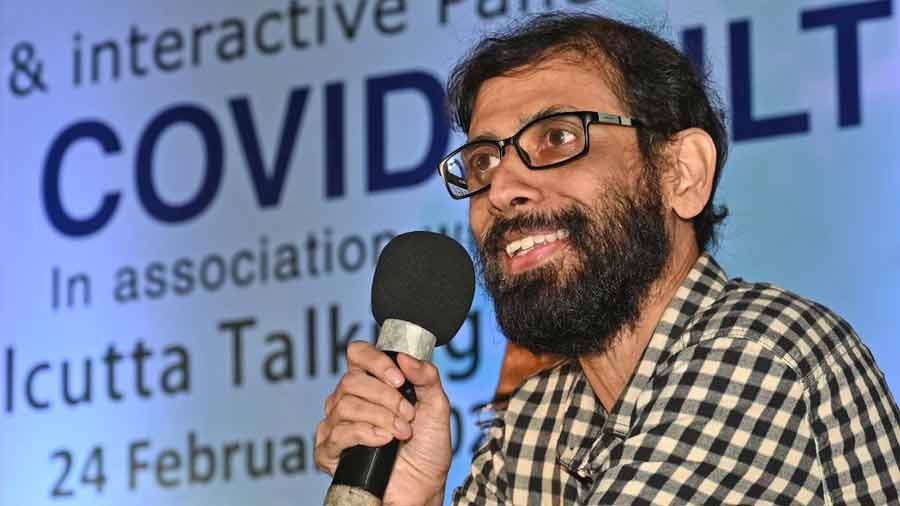
Chandril Bhattacharya had the audience at Calcutta Club roaring with laughter
The last speaker for the evening was Chandril Bhattacharya who, commenting on the impact of Covid-19 on society, had the audience and the other panellists either shaking their heads or roaring with laughter. “We as a society have learned a great skill, that of blaming others — doctors, politicians, intelligentsia — while saying we are not responsible, forgetting that we also belong to some category or the other,” began Bhattacharya’s speech which tore into the hypocrisy and false bravado of people. “As soon as the second wave hit, the doctors, who had never got so much screen time before, the politicians, the intelligentsia all came and talked about how irresponsible it was to hold elections the way it was, how irresponsible it was to hold the Kumbh Mela, as if the general public was either personally carried by the politicians to the meetings and the melas or they were tied and beaten to do the same,” said Bhattacharya. But he also pointed out how the same “general society”, especially the young people who are usually “written off” as self-involved, came forward at the time of need, whether it was to supply oxygen or deliver groceries or food or medicine.
He also talked about the “great resignation” and the “gig economy” as a result of the pandemic and how it is a telling shift in mindset about work and living. “A lot of what we have experienced will change us as a society in bits and parts is something I can say with conviction, but how long we will keep wearing masks, I have no clue,” said Bhattacharya, wrapping up the discussion.
The evening ended with a remembrance of the sacrifice made by the entire medical fraternity, particularly the 1,000-odd doctors who have lost their lives to the pandemic, and by saluting the warriors continuing their work.
